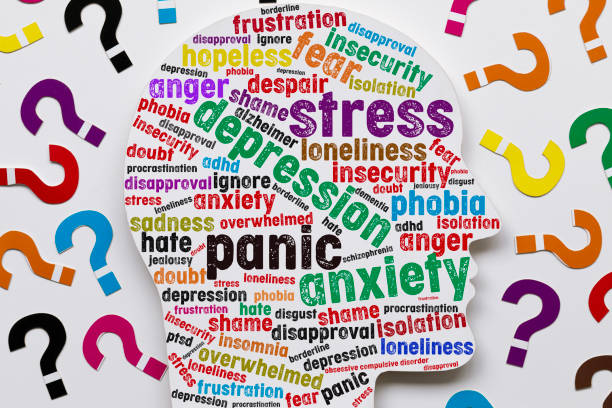Definition
Apathy is a sign or impermanent rational state considered by inconsequence, emotional unfriendliness, indifference. It presentations itself in place of meaninglessness, impartiality as of what is fashionable, lack of enthusiasm for any activity, decreased emotions, deliberateness of actions. Diagnosis depends on the cause of apathy, the main methods are clinical interview, observation, psychological testing. Additionally, a neurologist’s examination and instrumental brain examination are prescribed. Symptomatic treatment methods include psychotherapy, pharmacotherapy, and correction of the daily routine.

General characteristics
During the period of apathetic mood, indifference to all external events is formed, emotions become weakly expressed or absent altogether, interest and desire for action decrease. In men, this condition manifests itself more clearly, occurs more often: they spend a significant part of their time at home, do not go to work, refuse friendly meetings, usual hobbies, and sports. Popular women apathy is formed less often due to their natural emotionality & greater involvement in social interactions caring for children, communicating with friends, meeting with parents.
The basic psychological mechanism of apathy development is the depletion of mental energy reserves (emotions, motivations, involvement). In strong publics, meaninglessness and ennui are the result of prolonged excitation of the central nervous system. The brain begins to induce inhibition processes, protecting the body from further waste of energy, excessive nervous tension. Sometimes apathy, arising as a defensive reaction, is fixed as part of the personality, and then subconsciously used in certain periods of life.
In men, apathy is accompanied by an unwillingness to perform hygiene procedures, get out of bed, or eat. In women, emotional devastation is more noticeable – loss of interest in communication and hobbies, inability to rejoice, be sad, or get angry. Apathetic people are often absent minded or inattentive and cannot cope with routine tasks.

They cannot choose clothes make a shopping list & cook dinner.
Other characteristic symptoms, equally common in both men and women, are general weakness, slow reactions, a feeling of loneliness, and memory impairment. It is worth distinguishing laziness and depression from apathy, since these conditions are symptomatically very similar. Laziness is selective – you do not want to do certain actions that do not bring pleasure. At the same time, a person can easily start doing what he likes – go for a walk, meet with friends. Apathetic states cause paralysis of any activity, a complete lack of desire.
Depression is characterized by a decrease in mood, the prevalence of negative emotions – sadness, sorrow, disappointment, depression. When apathy develops, positive and negative emotions are smoothed out, practically absent. Anxious depression occurs with motor restlessness, an apathetic state is always accompanied by slowness of movements . Sometimes it becomes a manifestation of severe depression: patients are indifferent to current events, sit or lie motionless for a long time, without talking.
Apathy’s common reasons
Emotional exhaustion develops as a result of stress, psychotraumatic situations, and previous somatic diseases. In addition, it is a symptom of mental disorders and organic lesions of the nervous system. Apathy canister remain a momentary condition a manifestation of another pathology &a side effect of taking medications. In men, it often develops against the background of alcohol and drug use . It occurs as an independent disorder, and in combination with lack of willpower it represents an apathetic-abulic syndrome, and in the absence of motor activity, an adynamic syndrome.

Psychological reasons
In men and women, mild apathy can be a character trait, combined with low social activity, slowness, phlegmatic nature. The causes of apathy as a state of maladaptation are situations that deplete motivational and emotional resources. Personal qualities or external events for which a person was not prepared are considered as provoking psychological factors. Causes of apathy:
Emotional shock. Apathy as a defensive reaction of the psyche is formed in response to intense positive or negative experiences. In women, it is provoked by the birth of a child, in men, the main reasons are the loss of a previous social status, dismissal from a high position, refusal to hire.
Unachievable goals. Folks through high anxieties on themselves tend to set high goals and make maximum efforts to achieve them. The reasons for apathy in such cases are extremely difficult, overwhelming tasks that reduce faith in success and give rise to dissatisfaction with oneself.
Lack of purpose. The state-owned of emotional blankness and lack of resourcefulness stand up in situations. After previous goals have been achieved, but new ones have not been formed. The forces are spent, the needs are satisfied, the person is apathetic for some time. Examples of such situations: a student after passing the exam session, an entrepreneur who has achieved high profits.
Lack of independence. This personality trait is manifested by a passive-defensive behavior strategy. The reasons for apathy are shifting responsibility to other people like wait and see attitude fear of failure & absence of independence.
Stress. Sometimes situations of high emotional tension provoke the development of a defensive reaction – apathy. The psyche involuntarily switches to energy saving mode: the patient stops defending his position, loses interest in activities, becomes indifferent, apathetic.
Frustration. This term refers to a condition that occurs when it is impossible to satisfy a pressing and strong need. For women, typical causes of apathy are an unsuccessful marriage, fear of divorce; for men, doing an unloved job, lack of prospects for other income.
Monotony of life. A common cause of apathy in women is a lack of new impressions, a stable routine with no interesting activities. Most daily tasks are done automatically, events are predictable, and there is no time left for hobbies, creativity and research.

Mental Health Disorders Linked to Apathy
Possible causes of pathological apathy are mental disorders. In patients, signs of apathy are clearly expressed, reduce social activity, interfere with the implementation of household chores, hygiene procedures. Often, such people need daily outside care, organizing and stimulating help from relatives. The most common mental illnesses that occur with apathy include:
- Depression . The main signs of depressive disorder are low mood, loss of ability to get pleasure, feeling of meaninglessness of what is happening. There is apathetic depression – a state of indifference, apathy. It develops more often in women, provoked by prolonged stress.
- Schizoid personality disorder . Schizoid psychopathy is a pathological change in character, manifested by isolation, stinginess of emotional experiences, a tendency to theorize and philosophical reflections. It is more often determined in men. Such people may seem apathetic in the sphere of social contacts, but often have peculiar hobbies.
- Schizophrenia . This endogenous mental disorder is characterized by the disintegration of thought processes, flattening, and impoverishment of emotional reactions. More often, apathetic states are observed as a manifestation of sluggish schizophrenia with a gradual, continuous deterioration of the patient’s condition.
- Hospitalism . When a patient is hospitalized for a long time and has no contact with loved ones, a mental disorder called hospitalism develops. It manifests itself as weight loss, lethargy, apathy, drowsiness, and isolation.
Neurological Causes of Apathy
Apathy can be a symptom of neurological diseases – dementia, brain tumors, strokes , neuroinfections, traumatic brain injuries. It manifests itself on the basis of organic brain damage (vascular, neurodegenerative, traumatic). It is especially characteristic of pathologies accompanied by damage to the frontal lobe, anterior cerebral artery, pituitary gland or limbic structures. Frequent neurological causes of apathy:

- Infections. Apathetic symptoms appear in neuroinfections , when pathogens spread in the nervous tissues, as well as in general severe infections with secondary involvement of the nervous system in the pathological process. Thus, meningitis is characterized by fever with a change in apathetic states to severe anxiety. For HIV infection a plodding increase in apathy, depression.
- Dementia . The cause of apathy in patients with dementia is changes in the white matter of the brain, which occur due to age-related degradation of small blood vessels. 82% of elderly women and men with frontal lobe lesions show signs of apathy: dulling of emotions, decreased motivation and initiative. The risk group includes patients with Alzheimer’s disease , Pick’s disease , vascular and mixed dementia.
- Remote consequences of TBI. Mental disorders often occur in the remote period of traumatic brain injury . Apathy is diagnosed in people with astheno-neurotic syndrome , in whom the consequences of the injury are represented by high fatigue, decreased performance, memory disorders.
- Brain tumors . Meaninglessness and laziness are perceived in cases where the tumor is localized in the frontal lobes or pituitary gland. Signs of emotional disturbance appear already at the initial stages of tumor development, in addition to apathy, they may include depression, infantilism, tearfulness, irritability.
Taking medications and alcohol
Long-term use of some drugs leads to the development of side effects accompanied by apathy. The highest risk is when taking tranquilizers, antidepressants, sleeping pills, oral contraceptives, antibiotics. In both cases, emotional disturbances are caused by biochemical changes in the processes of the central nervous system in the parts of the brain responsible for emotions. Apathy occurs within the framework of the following syndromes:
- Neuroleptic syndrome . Long term procedure of neuroleptics container cause affective disorders diminished cognitive functions social activity. Mental inhibition, akinesia, asthenia develop. Neuroleptic insufficiency supreme every so often marks men and women with bipolar affective disorder , schizophrenia, endogenous depression.
- SSRI-induced syndrome. This complication is a consequence of long-term treatment with antidepressants of the selective serotonin reuptake inhibitor group. Apathetic syndrome is found in patients with panic disorder , generalized anxiety disorder, depression, and obsessive-compulsive neurosis .
- Side effect of sleeping pills. Sleeping pills have a depressing effect on the synaptic transmission of CNS signals, so a person feels drowsy and falls asleep. They deform the natural sleep formula, suppress the rapid phase. After awakening, a feeling of fatigue arises, work capacity decreases, emotional detachment and indifference are formed.
Withdrawal syndrome . The reason for the apathy of men who abuse alcohol is the state of withdrawal (hangover). At the first stage of alcoholism, when you stop drinking, you feel exhausted and sleepy, apathy or irritable aggressiveness increases. At the second stage,

Mental illnesses
Possible causes of pathological apathy are mental disorders. In patients, signs of apathy are clearly expressed, reduce social activity, interfere with the implementation of household chores, hygiene procedures. Often, such people need daily outside care, organizing and stimulating help from relatives. The most common mental illnesses that occur with apathy include:
- Depression . The main signs of depressive disorder are low mood, loss of ability to get pleasure, feeling of meaninglessness of what is happening. There is apathetic depression – a state of indifference, apathy. It develops more often in women, provoked by prolonged stress.
- Schizoid personality disorder . Schizoid psychopathy is a pathological change in character, manifested by isolation, stinginess of emotional experiences, a tendency to theorize and philosophical reflections. It is more often determined in men. Such people may seem apathetic in the sphere of social contacts, but often have peculiar hobbies.
- Schizophrenia . This endogenous mental disorder is characterized by the disintegration of thought processes, flattening, and impoverishment of emotional reactions. More often, apathetic states are observed as a manifestation of sluggish schizophrenia with a gradual, continuous deterioration of the patient’s condition.
- Hospitalism . When a patient is hospitalized for a long time and has no contact with loved ones, a mental disorder called hospitalism develops. It manifests itself as weight loss, lethargy, apathy, drowsiness, and isolation.
Brain and Nerve Disorders Related to Apathy
Apathy can be a symptom of neurological diseases – dementia, brain tumors, strokes , neuroinfections, traumatic brain injuries. It manifests itself on the basis of organic brain damage (vascular, neurodegenerative, traumatic). It is especially characteristic of pathologies accompanied by damage to the frontal lobe, anterior cerebral artery, pituitary gland or limbic structures. Frequent neurological causes of apathy:
- Infections. Apathetic symptoms appear in neuroinfections , when pathogens spread in the nervous tissues, as well as in general severe infections with secondary involvement of the nervous system in the pathological process. Thus, meningitis is characterized by fever with a change in apathetic states to severe anxiety. For HIV infection a plodding increase in apathy, depression.
- Dementia . The cause of apathy in patients with dementia is changes in the white matter of the brain, which occur due to age-related degradation of small blood vessels. 82% of elderly women and men with frontal lobe lesions show signs of apathy: dulling of emotions, decreased motivation and initiative. The risk group includes patients with Alzheimer’s disease , Pick’s disease , vascular and mixed dementia.
- Remote consequences of TBI. Mental disorders often occur in the remote period of traumatic brain injury . Apathy is diagnosed in people with astheno-neurotic syndrome , in whom the consequences of the injury are represented by high fatigue, decreased performance, memory disorders.
- Brain tumors . Meaninglessness and laziness are perceived in cases where the tumor is localized in the frontal lobes or pituitary gland. Signs of emotional disturbance appear already at the initial stages of tumor development, in addition to apathy, they may include depression, infantilism, tearfulness, irritability.
Taking medications and alcohol
Long-term use of some drugs leads to the development of side effects accompanied by apathy. The highest risk is when taking tranquilizers, antidepressants, sleeping pills, oral contraceptives, antibiotics. In both cases, emotional disturbances are caused by biochemical changes in the processes of the central nervous system in the parts of the brain responsible for emotions. Apathy occurs within the framework of the following syndromes:
- Neuroleptic syndrome . Long term procedure of neuroleptics container cause affective disorders diminished cognitive functions social activity. Mental inhibition, akinesia, asthenia develop. Neuroleptic insufficiency supreme every so often marks men and women with bipolar affective disorder , schizophrenia, endogenous depression.
- SSRI-induced syndrome. This complication is a consequence of long-term treatment with antidepressants of the selective serotonin reuptake inhibitor group. Apathetic syndrome is found in patients with panic disorder , generalized anxiety disorder, depression, and obsessive-compulsive neurosis .
- Side effect of sleeping pills. Sleeping pills have a depressing effect on the synaptic transmission of CNS signals, so a person feels drowsy and falls asleep. They deform the natural sleep formula, suppress the rapid phase. After awakening, a feeling of fatigue arises, work capacity decreases, emotional detachment and indifference are formed.
- Withdrawal syndrome . The reason for the apathy of men who abuse alcohol is the state of withdrawal (hangover). At the first stage of alcoholism, when you stop drinking, you feel exhausted and sleepy, apathy or irritable aggressiveness increases. At the second stage, vegetative disorders become more pronounced – headaches, blood pressure changes, increased sweating.
Survey
To find out the causes of apathy, it is necessary to consult a psychiatrist and a neurologist. The examination begins with a clinical interview of the patient: the duration and severity of apathy, provoking factors are determined. With severe apathy, patients remain indifferent, do not answer the doctor’s questions on their own, the conversation is conducted with relatives. The following methods are indicated for a more accurate determination of the cause of apathy:
- Psychodiagnostic testing. A set of tests for men and women is selected by a psychologist individually. Various self-assessment tests are used, for example, the Beck Depression Inventory, and complex personality questionnaires – the Cattell questionnaire, SMIL, Eysenck questionnaire. If schizophrenia or dementia is suspected, a pathopsychological study of cognitive functions (thinking, intelligence, memory) is carried out.
- Neurological examination. Apathetic patients with symptoms of nervous system damage are examined by a neurologist . Using a survey and special tests, the neurological status is assessed, the nature of the CNS damage (focal, diffuse), the localization of the lesion are determined, and the main pathophysiological mechanism is established. The data from the neurological examination allow the doctor to suggest the causes of apathy and select instrumental procedures to clarify the diagnosis.
- Instrumental examination of the brain. To assess the nature of brain damage, determine the localization of the lesion, visualization methods of examination are used: MRI of the brain and feeding vessels, ultrasound of the vessels of the head and brain structures, CT of the brain. Apathy often accompanies damage to the prefrontal zones, pituitary gland, limbic system.
Treatment
Lethargy remains not constantly a condition that needs to be treated. If a person has become less emotional and proactive after a period of high stress or a traumatic situation, you need to give the body time to recover – ensure adequate sleep, healthy nutrition, protect from worries, mental stress. If apathy is pronounced, lasts more than a week, significantly worsens the patient’s quality of life, special treatment is necessary, including psychotherapy , medication, changes in rest and work patterns.
A good rest helps to overcome apathy
Psychological help
To improve the condition, methods of cognitive behavioral therapy and psychoanalysis are used . With the help of a psychologist, the patient again learns to feel his emotions, set goals, and resist stressful influences. At the second stage of therapy, it is possible to attend group trainings – interaction with other people increases a person’s interest and motivation.
Drug treatment
In case of severe apathy due to mental and neurological diseases, pharmacological drugs are used: psychostimulants, antidepressants, analeptics. Their combination, dosage and duration of administration are determined by the doctor individually.
Lifestyle correction
In addition to dealing with what causes apathy, it’s a good idea to start with new activities, even those that don’t seem appealing yet. You should think back on what hobby captured your interest in the past – sports, art or learning on your own. You should aim to avoid stressful situations, balance your time between work and relaxation, eat food that is healthy and keep yourself active in ways that won’t overwork you. A loved one should be part of the first stages of recovery, as their willpower helps organize and boost the patient.
